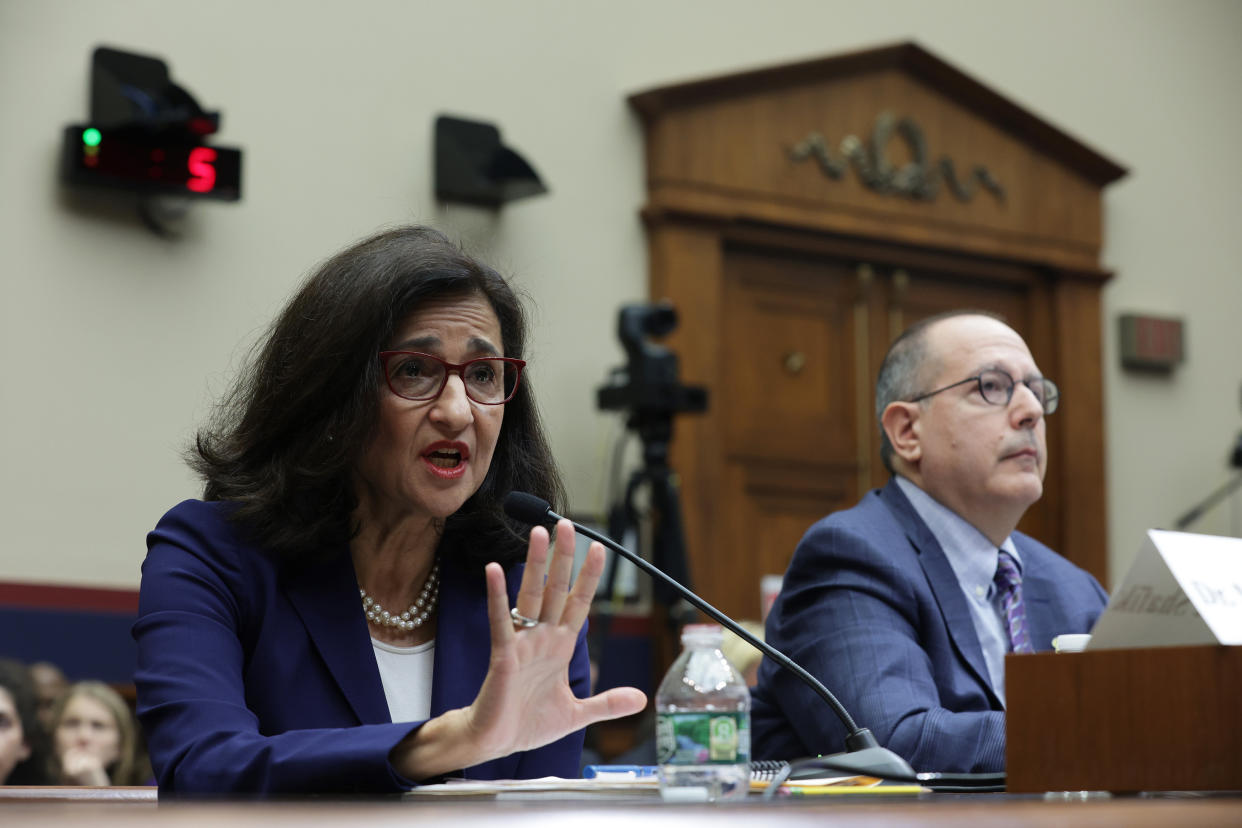Columbia University faculty members pass vote of no confidence in President Shafik after pro-Palestinian protests

- Oops!Something went wrong.Please try again later.
NEW YORK — Arts and sciences faculty at Columbia University passed a vote of no confidence in embattled college President Minouche Shafik, whose congressional testimony and handling of pro-Palestinian protests created a bitter divide on campus, according to results announced Thursday.
Hundreds of Columbia faculty have also signed onto a strike, pledging to “only do work that directly serves students” for as long as there is a police presence on campus. Shafik has authorized the NYPD to remain on campus until Friday, after all graduation ceremonies have ended.
Ballots in the no confidence vote were open for a week to about 900 professors from the main part of the university — roughly 20% of Columbia’s faculty — on a highly critical resolution alleging Shafik’s administration made unilateral decisions that put students and staff in harm’s way.
Close to 65% of respondents said they had no confidence in the president, results show. About 29% voted against the resolution, while the remainder abstained. The vote was not binding and did not demand Shafik’s resignation, but represented the strongest criticism yet of the new university president, who was inaugurated last fall.
“The president’s choices to ignore our statutes and our norms of academic freedom and shared governance, to have our students arrested, and to impose a lockdown of our campus with continuing police presence, have irrevocably undermined our confidence in her,” read the resolution.
“A vote of no confidence in the president is the first step towards rebuilding our community and reestablishing the university’s core values,” it continued.
Just short of 8 in 10 arts and sciences faculty participated in the vote, according to the results. Last school year, Columbia employed more than 4,600 full-time faculty, including from other programs such as the law or journalism schools that did not receive ballots.
“President Shafik continues to consult regularly with members of the community, including faculty, administration, and trustees, as well as with state, city and community leaders,” said Columbia spokesman Ben Chang in a statement. “She appreciates the efforts of those working alongside her on the long road ahead to heal our community.”
The vote comes after the Columbia administration on April 30 called in the NYPD to end the takeover of a campus building, Hamilton Hall, and dismantle the Gaza solidarity encampment, leading to more than 100 arrests in and around campus.
It was the second time in recent weeks Shafik turned to police and mass arrests after doing so on April 18 to shut down a tent demonstration, which was first erected hours ahead of her appearance before Congress and sparked a national movement of college protests against Israel’s war in Gaza.
Hours before the vote was launched, Shafik in an internal email to faculty acknowledged the difficult end of the semester, saying empathy and dialogue were absent “too often” over the past several months and taking “full responsibility” for leading an effort to restore them.
“I know that many of you are angry, and that you feel let down by me and by other university leaders for many different reasons,” Shafik wrote.
“I trust that this community — with its collective brilliance and history of engaging in critical dialogue about the important issues of our time — can come through this period, that has tested our institution, even stronger,” she continued. “And I am committed to doing the hard work — of listening, of supporting change, and of repair — that is required.”
Despite the show of waning support from faculty, Columbia’s Board of Trustees continued to back the university president. In a letter to the editor in The Washington Post on Wednesday, the board co-chairs reaffirmed their confidence in Shafik and her leadership style of “collaborative decision-making.”
“Leadership in a crisis is a burden,” co-chairs Claire Shipman and David Greenwald wrote, “and it’s one she has borne with great wisdom and moral clarity. She is trying to navigate a path that is in the best interests of the institution and all those who love it. It is disappointing, but perhaps not surprising, that in a time of crisis, the voices of critics tend to be the loudest.”
“The board supports her leadership and feels she is the best leader for Columbia,” added the pair, who appeared before Congress on April 17 alongside Shafik and Columbia antisemitism taskforce co-chairman David Schizer, a law professor.
The no-confidence resolution was introduced by the campus chapter of the American Association of University Professors, a professional faculty organization. In it, faculty raised concerns about Shafik’s congressional testimony, when she committed to fire one professor and announced another two faculty members were under investigation over comments about Israel.
“These are politically motivated attacks that unfortunately our administration has been unable or unwilling to address,” said Reinhold Martin, a Columbia architecture professor and the incoming AAUP chapter president.
The Columbia arts and sciences faculty’s motion was the second on campus after Barnard faculty passed a similar resolution against the affiliated women’s college president, Laura Rosenbury, who was also inaugurated this year. The unprecedented measure was also the first no-confidence vote against a Columbia president, faculty said.
_____

